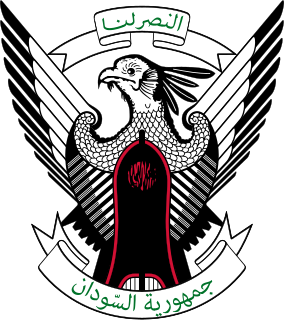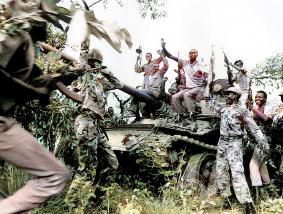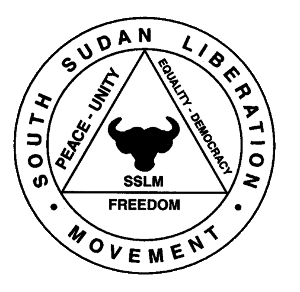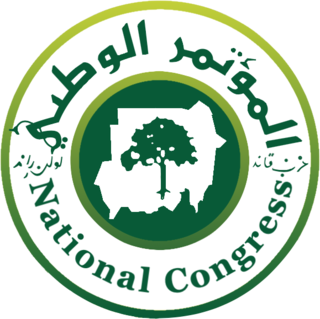
Currently, the politics of Sudan takes place in the framework of a federal provisional government. Previously, a president was head of state, head of government, and commander-in-chief of the Sudanese Armed Forces in a de jure multi-party system. Legislative power was officially vested in both the government and in the two chambers, the National Assembly (lower) and the Council of States (higher), of the bicameral National Legislature. The judiciary is independent and obtained by the Constitutional Court. However, following a deadly civil war and the still ongoing genocide in Darfur, Sudan was widely recognized as a totalitarian state where all effective political power was held by President Omar al-Bashir and his National Congress Party (NCP). However, al-Bashir and the NCP were ousted in a military coup which occurred on April 11, 2019. The government of Sudan was then led by the Transitional Military Council or TMC. On 20 August 2019, the TMC dissolved giving its authority over to the Sovereignty Council of Sudan, who were planned to govern for 39 months until 2022, in the process of transitioning to democracy. However, the Sovereignty Council and the Sudanese government were dissolved in October 2021.

The Second Sudanese Civil War was a conflict from 1983 to 2005 between the central Sudanese government and the Sudan People's Liberation Army. It was largely a continuation of the First Sudanese Civil War of 1955 to 1972. Although it originated in southern Sudan, the civil war spread to the Nuba mountains and the Blue Nile. It lasted for 22 years and is one of the longest civil wars on record. The war resulted in the independence of South Sudan six years after the war ended.

John Garang de Mabior was a Sudanese politician and revolutionary leader. From 1983 to 2005, he led the Sudan People's Liberation Army during the Second Sudanese Civil War, and following a peace agreement he briefly served as First Vice President of Sudan for 3 weeks until his death in a helicopter crash on 30 July 2005. A developmental economist by profession, Garang was a major influence on the movement that led to the foundation of South Sudan.

The South Sudan Liberation Movement (SSLM) is an armed group that operates in the Upper Nile Region of South Sudan. The group's creation was announced in November 1999 by people of the Nuer ethnicity who were in both the rebel Sudan People's Liberation Army (SPLA) and the government-allied South Sudan Defence Forces (SSDF) gathered in Waat. The SSLM was declared to be unaligned in the Second Sudanese Civil War, then entering its sixteenth year. The name "South Sudan Liberation Movement" was decided upon the next year, borrowing from the earlier Southern Sudan Liberation Movement, which existed in the 1980s.

The National Congress Party was a major political party that dominated domestic politics in Sudan from its foundation until the Sudanese Revolution.
The National Democratic Alliance (NDA) is a group of Sudanese political parties that was formed in 1989 to oppose the regime of Omar Hassan al-Bashir after he seized power in a military coup on June 6, 1989. The NDA signed a deal with the Sudanese government on June 18, 2005, following a peace agreement to end the Second Sudanese Civil War on January 9, 2005. Some issues have yet to be resolved by opposing factions, including the conflict and humanitarian issues in the war-torn region of Darfur. After further violent clashes in the east, a separate peace deal was signed with the Beja Congress in October 2006.

Salva Kiir Mayardit, also known as Salva Kiir, is a South Sudanese politician who has been President of South Sudan since its independence on July 9, 2011. Prior to independence, he was President of the Government of Southern Sudan, as well as First Vice President of Sudan, from 2005 to 2011. He was named Commander-in-Chief of the Sudan People's Liberation Army (SPLA) in 2005, following the death of John Garang.

The Sudan People's Liberation Movement (SPLM) is a political party in South Sudan. It was initially founded as the political wing of the Sudan People's Liberation Army in 1983. On January 9, 2005 the SPLA, SPLM and Government of Sudan signed the Comprehensive Peace Agreement, ending the civil war. SPLM then obtained representation in the Government of Sudan, and was the main constituent of the Government of the then semi-autonomous Southern Sudan. When South Sudan became a sovereign state on 9 July 2011, SPLM became the ruling party of the new republic. SPLM branches in Sudan separated themselves from SPLM, forming the Sudan People's Liberation Movement-North. Further factionalism appeared as a result of the 2013-2014 South Sudanese Civil War, with President Salva Kiir leading the SPLM-Juba and former Vice President Riek Machar leading the Sudan People's Liberation Movement-in-Opposition.

This article covers the period of the history of Sudan between 1985 and 2019 when then Sudanese Defense Minister Abdel Rahman Swar al-Dahab seized power from Sudanese President Jaafar Nimeiry in the 1985 Sudanese coup d'état. Not long after, Field Marshal Omar al-Bashir, backed by an Islamist political party, the National Islamic Front, overthrew the short lived government in a coup in 1989 where he ruled as President until his fall in April 2019. During Bashir's rule, also referred to as Bashirist Sudan, he was re-elected three times while overseeing the independence of South Sudan in 2011. His regime was criticized for human rights abuses, atrocities and genocide in Darfur and allegations of harboring and supporting terrorist groups in the region while being subjected to United Nations sanctions beginning in 1995, resulting in Sudan's isolation as an international pariah.

Lieutenant General Nhial Deng Nhial is a South Sudanese politician and a member of the ruling Sudan People's Liberation Movement (SPLM). He was Minister of Foreign Affairs 2011 to 2013 and 2018 to 2019 after having served as the caretaker Minister of Defense since 10 July 2011. Prior to that he served as the pre-independence South Sudanese Minister of SPLA and Veteran Affairs, from 22 December 2008 until 9 July 2011.

A referendum took place in Southern Sudan from 9 to 15 January 2011, on whether the region should remain a part of Sudan or become independent. The referendum was one of the consequences of the 2005 Naivasha Agreement between the Khartoum central government and the Sudan People's Liberation Army/Movement (SPLA/M).

The South Sudan People's Defence Forces (SSPDF), formerly the Sudan People's Liberation Army (SPLA), is the army of the Republic of South Sudan. The SPLA was founded as a guerrilla movement against the government of Sudan in 1983 and was a key participant of the Second Sudanese Civil War, led by John Garang. After Garang's death in 2005, Salva Kiir was named the SPLA's new Commander-in-Chief. As of 2010, the SPLA was divided into divisions of 10,000–14,000 soldiers.

United Nations Security Council Resolution 1919, adopted unanimously on April 29, 2010, after recalling resolutions 1674 (2006), 1894 (2009) on the protection of civilians in armed conflict, 1612 (2005) and 1882 (2009) on children in armed conflict, 1502 (2003) on the protection of humanitarian and United Nations personnel, and 1325 (2000), 1820 (2008), 1888 (2009), and 1889 (2009) on women, peace, and security, the Council extended the mandate of the United Nations Mission in Sudan (UNMIS) until April 30, 2011 with the intention of renewing it further if necessary.
Jimmy Lemi Milla was a Sudanese politician, and Cabinet member in Southern Sudan. He was a Pojulu.

Sudan People's Liberation Movement – North, or SPLM–N, is a political party and militant organisation in the Republic of Sudan, based in the states of Blue Nile and South Kordofan. As of 2017, its two factions, SPLM-N (Agar) and SPLM-N (al-Hilu) were engaged in fighting each other and against the government of Sudan.

Southern Sudan was an autonomous region consisting of the ten southern states of Sudan between its formation in July 2005 and independence as the Republic of South Sudan in July 2011. The autonomous government was initially established in Rumbek and later moved to Juba. It was bordered by Ethiopia to the east; Kenya, Uganda, and the Democratic Republic of the Congo to the south; and the Central African Republic to the west. To the north lies the predominantly Arab and Muslim region directly under the control of the central government. The region's autonomous status was a condition of a peace agreement between the Sudan People's Liberation Army/Movement (SPLA/M) and the Government of Sudan represented by the National Congress Party ending the Second Sudanese Civil War. The conflict was Africa's longest running civil war.
Samuel Aru Bol was a prominent politician in Southern Sudan. During the Second Sudanese Civil War (1983-2005) he signed the Khartoum Peace Agreement of 1997 as representative for the Union of Sudan African Parties (USAP).
Joseph Oduho Haworu was a leading politician from South Sudan who was active in the struggle for independence and a founding member of the Sudan People's Liberation Movement (SPLM). He was part of South Sudan liberation
Ethnic violence in South Sudan has a long history among South Sudan's varied ethnic groups. South Sudan has 64 tribes with the largest being the Dinkas, who constitute about 35% of the population and predominate in government. The second largest are the Nuers. Conflict is often aggravated among nomadic groups over the issue of cattle and grazing land and is part of the wider Sudanese nomadic conflicts.

Gordon Muortat Mayen Maborjok (1922–2008) was a South Sudanese veteran politician and an advocate for the rights and freedom of the South Sudanese people. He was the President of the Nile Provisional Government (NPG) which led Anyanya I; Southern Sudan's first armed resistance to Khartoum which started in 1955. Muortat also served as Vice-President of the Southern Front (SF) and Foreign Minister in the Southern Sudan Provisional Government (SSPG).















